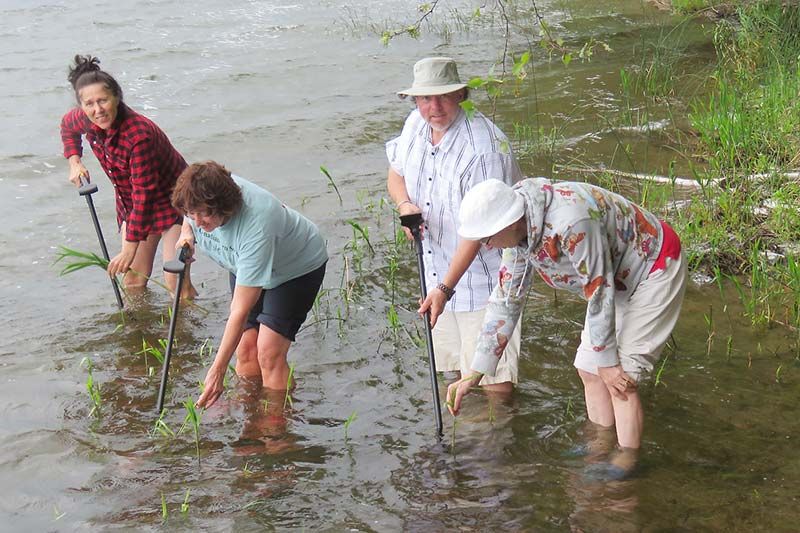Feb 20, 2019
The White Lake Cottagers Association (Olden) is pretty small. It has no website, no comprehensive lake plan, not even an annual fish fry or bake sale, and only 45 members representing 25 cottages.
But nonetheless they are about to win a major award from the Federation of Ontario Cottage Associations (FOCA).
The Association, which was founded in 1973, has taken on the important responsibility of helping to keep the waters of the lake clean enough to be used by the White Lake Fish Culture Station, an Ontario Ministry of Natural Resources facility.
In their application to FOCA for the award, which was submitted in November of 2018, Association President Jim Rose said that keeping the lake waters in pristine condition in order to maintain the fish culture station gives the lake a purpose beyond its own watershed.
“It is our understanding that White Lake is one of very few lakes with fish hatcheries in Eastern North America, in which fingerlings raised in its waters can be dropped into any other lake that supports that species of fish and the fingerlings will survive. The station is also working on enterprises to bring species back from the brink of extinction. For example, the fish culture station is involved in bringing the bloater, a small fish which supports lake trout, back from extinction in Lake Huron and the Saint Claire River. It is doing the same thing with a small bivalve, which is in danger of becoming extinct in a river in south western Ontario. Not only is the fish culture station involved in cutting edge research, it also stocks some 220 lakes in Ontario,” he wrote.
White Lake has been motor-free since 1977, and association members are so committed to preventing zebra mussels from entering the lake that they have offered up their own canoes and kayaks to visitors coming to the lake, so that any contamination threats, even from very small boats, is minimised.
A couple of years ago, a cousin of Jim and Joan Rose (Rose is one the Environmental Officers on the Association Executive) was visiting them on the lake.
“She looked out from the dock and said, ‘you have invasive phragmites on your lake. They will take over if you don’t do something.’ I asked her what he had to do and she said it would take three years and hundreds of hours to get rid of them. She was right,” said Joan Rose.
The invasive phragmites likely spread from roadsides since they can root under water or on land. There is no point trying to pull them out by the roots because that is more or less impossible and only leads them to get stronger and spread. They can be cut off just under the water, taking care to remove any seed heads that are above the water first.
The While Lake Cottage Association applied for and received $1,000, over two years, from FOCA for equipment, and members spent 380 hours in the summer of 2017, removing phragmites, transporting all the material to the shore where it was left to dry out far back from the lake and burned. In the summer of 2018 they only had to spend 98 hours doing the same thing and they hope to do the final eradication this coming summer.
The Association is also working to give the lake a special designation in the new Central Frontenac Official Plan, in order to keep protections in place.
“We don’t oppose development on White Lake, as long as it is managed carefully,” she said, “and so we have an opportunity to meet the new people and explain what the lake is all about.”
One of the neighbours on the lake is the Shabot Obaadjiwan First Nation, who have established a band centre and heritage lands on the west end of the lake.
“We have very good relations with Chief Doreen Davis,” said John Rose, and they are committed to protecting the lake in its current state.
The ceremony honouring the White Lake Cottage Association will take place in Toronto in early March at the FOCA Annual General Meeting and Spring Seminar at the swanky Boulevard Club in Toronto.
More Stories
- Latest CUPW Job Action Stops Postal Delivery Of The Frontenac News Forcing Alternate Plans
- Opponents of Barbers Lake Gravel Pit Pack Ag Hall in McDonalds Corners
- Bobsleigh Olympian Jay Dearborn At Mikes Pizza In Sydenham
- The Loins Club Of and O'Lakes Roar
- North Frontenac Back Roads Studio Tour - September 27 and 28
- Sunday Market Vendors Give Back
- George Street Work As Town Hall Renovation Nears Completion
- One Way Street Plan Hits A Dead End - Central Frontenac Council, September 9
- Global Gardening
- No Winner Yet in Catch The Ace But Fundraising Target Met

